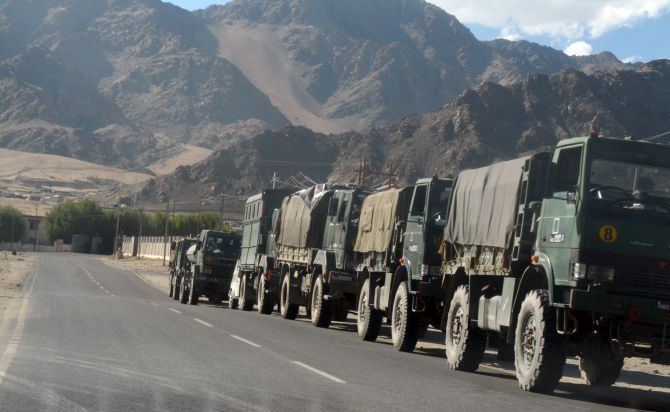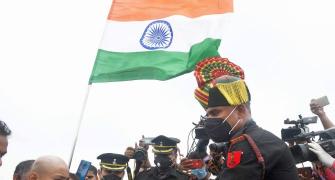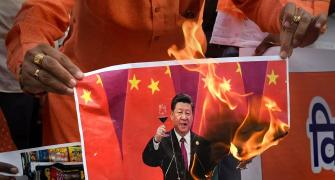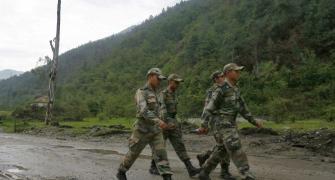'The logical step is to challenge the very legitimacy of the Chinese claim over Tibet,' recommends Inspector General Gurdip Singh Uban (retd).

His Holiness turns 85 on Monday, July 6. Photograph: PTI Photo
The Chinese army has, in the Galwan Valley, with premeditated unprecedented brutality, killed 20 of our soldiers including their Commanding Officer, and injured scores of others.
There is righteous indignation in a nation so intensely proud of the courage and valour of its armed dorces.
Our experienced, battle hardened, army will, no doubt, take all necessary measures to deal with this situation.
In the interim, cooler heads have prevailed, de-escalation is on the cards, but will it end there?
Incidents have already erupted on the Depsang plains and in the Hot Springs area.
Has the change in the status of Ladakh, combined with road building and development activity, well within our rights as a sovereign nation, spooked China since all this is in close proximity to its arterial Highway 219 in Tibet.
Has the reassertion of our rightful ownership of Gilgit Baltistan, which would threaten both the China Pakistan Economic Corridor as also the Belt and Road Initiative added to the Chinese discomfiture?
The erection of tents, stone bunkers covered by tarpaulins, and an open display of guns and vehicles by the Chinese, is more akin to a psychological war as opposed to active hostilities.
Are we losing sight of the wood for the trees?
Both countries would wish to avoid war.
It is time to reflect on the manner in which we deal with this bellicose neighbour.
China has a history of belligerency with its neighbours over territorial claims.
In 1969, the Ussuri river clash with the then Soviet Union brought the Chinese to the negotiating table only after it had been pulverised by the then USSR's multi-barrel rocket launchers.
Ten years later, plucky Vietnam took on the Chinese invasion of their homeland and forced a draw.
If we analyse the Chinese psyche we find it rooted in its grandiosity of the Middle Kingdom, the centre of the universe, and head of the Confucian family.
With unwavering determination, China embarked on the road of economic growth which gave it the requisite military muscle.
Trade is the mantra which will propel China forward, and hence is to be perpetuated.
The Belt and Road Initiative, enhancing trade routes along the traditional Silk Road, is to be multiplied by securing sea lanes.
America is the main opponent to world hegemony, while others are to be needled and intimidated so that they fall in line.

Despite debilitating sanctions by America, worldwide condemnation over the coronavirus pandemic, and recent losses to its industry and trade, what explains the belligerent simultaneous opening of so many fronts by China?
Its cartographic aggression extends to the whole of the Indo Pacific region.
Its military manoeuvres and territorial onslaught on all nine nations of the South China Sea claiming maritime dominance, combined with an aggressive display of naval and air power and its latest forays into Indian territory needs analysis.
Could it be to reap advantage even as the world battles the pandemic, apprehension of threats to the BRI project, or an attempt to divert attention from an internal implosion?
The obvious choice for nations at the receiving end is to come together onto a common platform and confront China at every forum.
The strategic importance of Tibet cannot be over emphasised.
It is the roof of the world, with vast mineral and natural resources.
The mighty rivers that emanate from its expansive glaciers such as the Brahmaputra, Yangtse, Yellow river, Mekong, Salween and the Indus, together with thousands of their tributaries have nurtured civilisations in peripheral countries for centuries.
Kailash Mansarovar with its spiritual overtones tugs at the heartstrings of every Indian.
China has invested millions of dollars in Tibet, a country over which its hegemony is suspect.
Sustaining an army and air force at those altitudes is a logistic nightmare.
The roads, railway and pipeline traverse extremely hostile terrain averaging 10,000 to 12,000 feet above sea level.
Wind swept and snow bound, it is tenuous at best.
Additionally, all these pass through areas inhabited by restive ethnic groups who resent the taking over of their lands, interference in their culture, and resettling of the Han Chinese population on their homelands.
The CPEC has similar problems as it passes through recalcitrant Baluchistan and Shia dominated Gilgit Baltistan.
The cause of these oppressed people must be taken up at all forums to force China to recoil.

The logical step therefore is to challenge the very legitimacy of the Chinese claim over Tibet.
Historically, Tibet has been an independent nation till the 13th century when Genghis Khan and his hordes swept through China and ruled over the Chinese for a century.
During his grandson Kublai Khan's reign, Tibet was ruled by a separate entity from the Chinese provinces.
Thereafter, there were competing claims from both countries depending on the strength of the reigning monarchs.
It was only during the reign of the sixth Dalai lama, who was murdered in 1706, that China began to seriously interfere in the affairs of Tibet.
After the fall of the Quing dynasty in 1913, Tibet expelled all Chinese officials and declared itself independent.
The signing of the Simla agreement in 1914 between the British, who had sent Francis Younghusband to capture Lhasa and the Tibet government, granted Autonomy to Tibet.
However, the Communist party which came to power in China in October 1949 declared its intention to 'liberate' and proceeded to invade Tibet in 1950.
We acquiesced to this naked aggression till our 'Hindi Chini Bhai Bhai' dream was rudely shaken in 1962.
China abrogates treaties at will.
On the 20th anniversary of the return of Hong Kong, Chinese spokesperson Lu Kang stated that the Sino British Joint Declaration of 1984 was a historical document that no longer had any realistic meaning.
Two can play the same game.

Simultaneously, there is an urgent need to address domestic issues.
For over seven decades, the Indian Army has been deployed to deal with internal dissensions in Kashmir and the North East.
Innovative out of the box solutions, of which there are many, need to be analysed realistically to free the army to perform its primary role of defending our borders.
It is time to stop the bleeding of manpower and national wealth on issues that need resolution.
We currently have a strong leadership that can, based on pragmatic solutions, put the house in order.
Let us take this opportunity to adopt a pragmatic approach to resolve issues for the sake of our future generations.
Inspector General Gurdip Singh Uban (retd) commanded special forces and served as a senior instructor at the Army War College.
Feature Production: Aslam Hunani/Rediff.com










